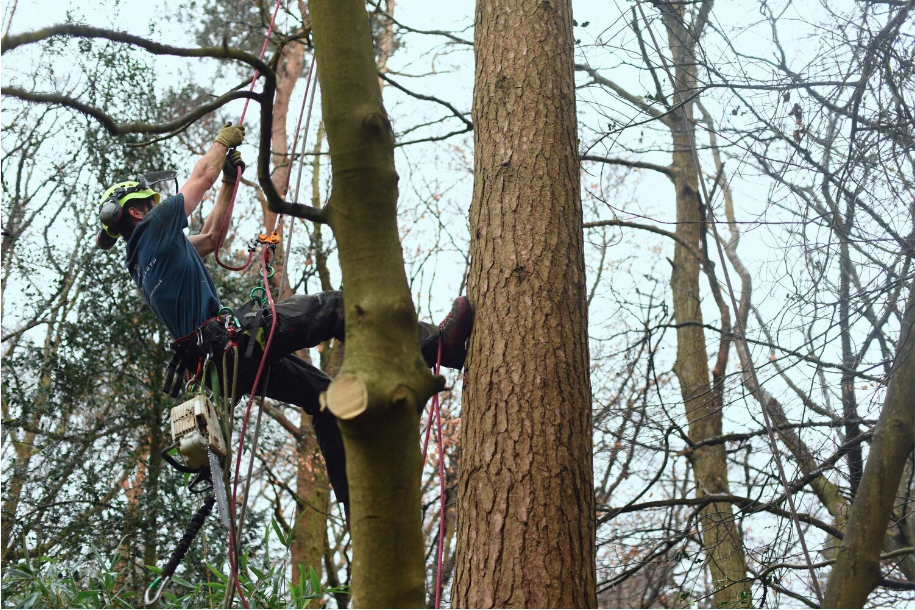How to go from a Beginner to an Advanced Tree Surgeon Specialist - Tree Care Training
Everyone who becomes a tree surgeon wants to eventually become an advanced tree surgeon. But how exactly is that accomplished? How do you go from a beginner to an advanced tree surgeon specialist? In this post, the team at DTE provide a basic roadmap that will enable you to reach your ultimate goal.
The 5 Steps to Becoming an Advanced Tree Surgeon Specialist
Follow these 5 steps to become an advanced tree surgeon specialist.
1: Get trained
Before you can become an advanced tree surgeon specialist you have to become a tree surgeon. DTE provide all the training you will ever need to launch your career in arboriculture. As part of your training, you should make sure to gain certification in chainsaw operation, first aid and more.
2: Gain practical experience
Once you've completed your basic training take a job working as an entry-level tree surgeon. You'll gain valuable experience felling trees, rigging and perhaps assisting with aerial rescues. Observe how the experienced tree surgeons handle complex situations while developing your problem-solving ability.
3: Develop your technical skills
As you gain practical experience you should also cultivate your technical skills such as operating stump grinders, performing tree health assessments and working with specialised climbing equipment.
4: Choose a niche
If you are intent on becoming an advanced tree surgeon specialist you will need to decide on an area of specialisation at some point. There are many areas of specialisation to choose from including urban forestry, pest control, tree preservation and more.
5: Build a reputation
If you show up on time every day, perform your work admirably, display an eagerness to learn and continually refine your skills others will notice and you will be on your way to building a reputation as someone dedicated to their work.
Why Advanced Tree Surgery Matters
Tree surgery is not just about cutting branches or removing trees. As you progress in your career, the work becomes more technical, more strategic, and more valuable to the communities and environments you serve. Advanced tree surgeons play a vital role in preserving urban greenery, managing mature trees, and advising on long-term care plans.
Being advanced in this field means you’re trusted with bigger responsibilities, more complex tasks, and leadership opportunities. It’s also where the highest earning potential lies. Whether you aim to lead a team, start your own company, or move into consultancy, advanced skills are what take you there.
Essential Skills and Knowledge for Advanced Tree Surgery
As you grow in your role, your technical knowledge, decision-making ability, and understanding of tree health must all keep pace. Here are a few core areas you’ll need to master:
Tree Risk Assessment
Advanced tree surgeons are often called to evaluate potential hazards. You’ll need to assess the condition of trees, identify structural weaknesses, and recommend safe, practical solutions. This requires a good understanding of tree biology, decay patterns, and local regulations.
Specialist Climbing and Rigging
While basic climbing gets you started, advanced roles require high-level rigging techniques and rescue planning. You may work in more challenging environments where precision, balance, and experience really matter.
Plant Health and Pest Control
Knowing how to spot diseases, manage infestations, or prevent the spread of harmful species is key. This is especially important when working with protected or high-value trees in parks, estates, or historic sites.
Equipment and Machinery Operation
You’ll be expected to use more than just a chainsaw. Advanced roles often include stump grinders, MEWPs, mobile cranes, and other heavy tools that require specialist training.
How to Stay Updated in the Industry
Arboriculture is always evolving, with new safety practices, tools, and environmental guidelines emerging all the time. To stay sharp, it’s important to regularly refresh your training and stay in touch with industry news.
Consider taking refresher courses or advanced tickets even after you’ve qualified. Attend workshops, subscribe to professional newsletters, or join online forums where arborists share ideas and updates. Keeping your knowledge current not only makes you more valuable to employers, it also boosts your confidence in the field.
If you’re ready to build these skills and move forward in your career, our advanced courses can support you at every step. Visit our training page to learn more about the next course start dates and find the right fit for your goals.
Conclusion
There is no real secret to getting ahead in arboriculture. If you adhere to the above steps and exhibit commitment and growth you will rise through the ranks to become the advanced tree surgeon specialist you want to be. When that happens you may even consider starting your own arboriculture business.

